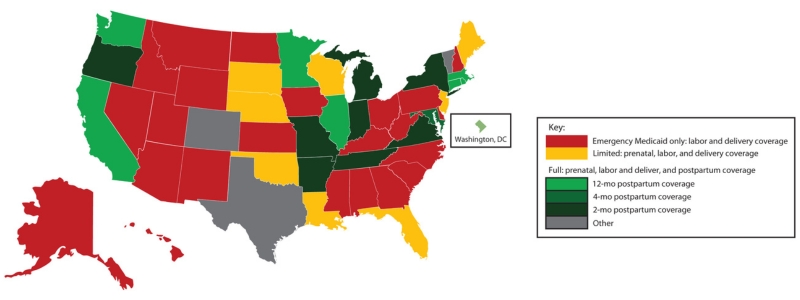Falling Through the Cracks: Pregnancy Coverage for Undocumented Mothers
Only 18 states offer comprehensive pregnancy care for undocumented mothers in the United States.

Read Time: 2 minutes
Published:
One of every sixteen infants in America is born to an undocumented immigrant mother. Undocumented mothers face significant barriers to prenatal care access, leaving them at higher risk for complications during labor and delivery. These challenges are believed to contribute to the growing maternal health disparities in the United States.
Federally, all states must provide Emergency Medicaid to those who qualify regardless of immigration status. Emergency Medicaid coverage includes labor and delivery costs for pregnant individuals. In cases deemed life-threatening, prenatal and postpartum care may also be covered.
States can provide further coverage through the Children’s Health Insurance Program (CHIP) or Medicaid expansion, helping bridge the gap between the federal mandate and full-spectrum care. However, many states do not provide expanded coverage, leaving many without comprehensive care.
Amanda DiMeo and colleagues analyzed state and federal policies regarding pregnancy-related insurance coverage for undocumented immigrants from state Medicaid and federal government websites.

The map above highlights the varying levels of pregnancy coverage available to undocumented individuals across the U.S. Twenty-seven states and Washington D.C. provide coverage beyond the federal mandate; only 18 and Washington D.C. provide comprehensive care. The remaining 23 states (shown in red) only offer labor and delivery coverage through Emergency Medicaid.
Expanding coverage, particularly during the prenatal period, has been shown to improve maternal and infant health outcomes. For example, in California and Oregon, coverage expansion led to increased usage of prenatal care by undocumented women. Birth outcomes for their children were also improved with a decrease in extreme low birth weight infants and infant mortality.
Fragmented policies and the absence of comprehensive care for all exacerbate disparities in maternal and infant health across the U.S., impacting already vulnerable populations and deepening the maternal health crisis.



